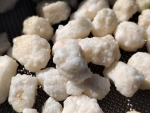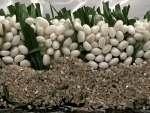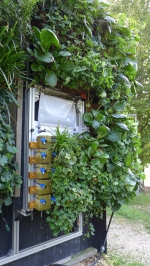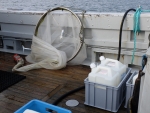-
-
-
Press release - 02/11/2023
The Sustainability Innovation Campus (ICN) initiated by the University of Freiburg and the Karlsruhe Institute of Technology (KIT), which will begin its work in January 2024, has announced a two-year funding programme for start-up projects. Scientists from the University of Freiburg, KIT and cooperating universities and research institutions are invited to submit their project outlines by 30 November 2023.
https://www.biooekonomie-bw.de/en/articles/pm/sustainability-innovation-campus
-
Wasser 3.0: #detect|remove|reuse - 31/10/2023

We all pollute our water with things we use in our everyday lives. In the process, microplastics and micropollutants accumulate in sometimes significant quantities and are difficult to remove. This has increasingly devastating consequences for our health and the environment. Wasser 3.0, a non-profit start-up from Karlsruhe, has declared war on this problem by developing a customisable process to detect, remove and even recycle these pollutants.
https://www.biooekonomie-bw.de/en/articles/news/how-sustainably-remove-and-recycle-microplastics-water
-
-
Microorganisms degrade biobased turf infill - 17/10/2023

There are thousands of artificial turf pitches in Germany. They are extremely practical, but often not at all environmentally friendly. When it rains or the pitch is used, plastic particles from the rubber granules can be released into the envronment, where they remain. Researchers at the University of Stuttgart along with the company TECNARO are now developing an artificial turf with an infill that biodegrades as soon as it leaves the pitch.
https://www.biooekonomie-bw.de/en/articles/news/eco-friendly-artificial-turf-sports-pitch-s-good-people-and-environment
-
-
-
Press release - 29/09/2023
The European Parliament’s amendments to the proposal for a Regulation on Artificial Intelligence (AI) may be defined as a socio-ecological turnaround compared to the European Commission’s existing draft. The parliamentary draft proposes a series of environmental and climate-related provisions which, in the Oeko-Institut’s view, are feasible and technically achievable. The Oeko-Institut has reviewed these proposals in a Policy Paper.
https://www.biooekonomie-bw.de/en/articles/pm/ecological-alignment-artificial-intelligence
-
-
-
-
-
-
-
-
-
-
-
-
-
-
Press release - 26/04/2023
Ready-made meals are ideal for quickly satisfying hunger. However, the quick snacks produce a lot of environmentally harmful plastic waste. To tackle this problem, the student team EDGGY from the University of Hohenheim in Stuttgart rolled up its sleeves and developed edible packaging made from eggshells and other plant-based raw materials. And even better: they simply dissolve in the hot water and can be eaten as an additional protein boost.
https://www.biooekonomie-bw.de/en/articles/pm/Simply-EGG-genious-Students-invent-edible-packaging-from-eggshells
-
Press release - 25/04/2023
Roboticists at the Max Planck Institute for Intelligent Systems in Stuttgart have developed a jellyfish-inspired underwater robot with which they hope one day to collect waste from the bottom of the ocean. The almost noise-free prototype can trap objects underneath its body without physical contact, thereby enabling safe interactions in delicate environments such as coral reefs. Jellyfish-Bot could become a tool for environmental remediation.
https://www.biooekonomie-bw.de/en/articles/pm/jellyfish-robots-could-one-day-clean-worlds-oceans
-
Website address: https://www.biooekonomie-bw.de/en/search




